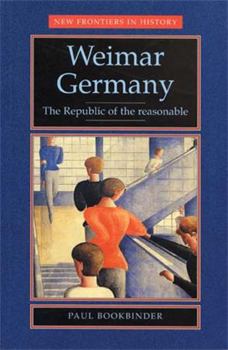Weimar Germany: The Republic of the Reasonable
(Part of the New Frontiers in History Series)
Select Format
Select Condition 
Book Overview
The Weimar period, which extended from 1919 to 1933, was a time of political violence, economic crisis, generational and gender tension, and cultural experiment and change in Germany. Despite these major issues, the Republic is often treated only as a preface to the study of the rise of Fascism. This text seeks to restore the balance, exploring the Weimar period in its own right. Amongst the topics discussed are: Weimar as the avant-garde artistic centre of Europe in the 1920s when many cultural figures were politically engaged on both sides of the political spectrum; Weimar as a German state racked by conflict over questions of morality versus ideas of greater sexual freedom for women, homosexual rights, abortion and birth control; the struggle to win the hearts and minds of German youth, a struggle won decisively by the right-wing; and Weimar as the first German state in which women played a significant political role.
Format:Paperback
Language:English
ISBN:0719042879
ISBN13:9780719042874
Release Date:October 1996
Publisher:Manchester University Press
Length:288 Pages
Weight:0.85 lbs.
Dimensions:0.5" x 5.3" x 8.3"
Customer Reviews
1 rating
This a well-reasoned and meticulously research analysis.
Published by Thriftbooks.com User , 27 years ago
Dr.Paul Bookbinder, with the assistance of Dr. Judith Bookbinder, has written a well-balanced, meticulously researched, and readable analysis of the fatal weakness that "reasonableness" represented for the ill-starred Weimar Republic. The author persuasively reveals how the Weimar Republic's inability or refusal to counter the extremist attacks from both left and the right and the republic's resulting vulnerability led inevitably to its destruction. This slender but profound volume belongs in the library of anyone interested in that dark period of German history.





